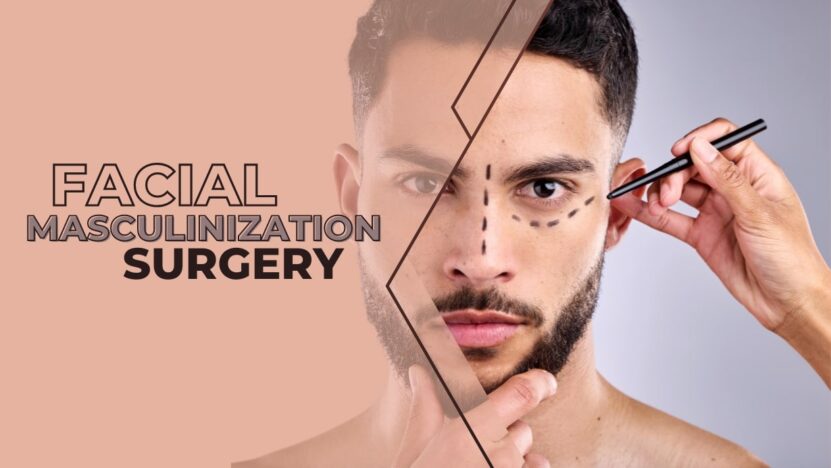The world of cosmetic and reconstructive surgery has grown by leaps and bounds over the past few decades, with cutting-edge procedures allowing people to express their true selves with confidence. One such procedure that has garnered increased attention in recent years is facial masculinization surgery (FMS). Designed to create a more masculine facial appearance, FMS can be a life-changing experience for transgender men, non-binary individuals, and cisgender men seeking facial harmony.
In this comprehensive guide, we will delve into the fascinating world of facial masculinization surgery, discussing its transformative potential, the various procedures involved, and how to make the best decisions for your unique journey. So, buckle up and join us as we explore the ins and outs of FMS and how it can help individuals attain their desired aesthetic goals.
The Transformative Potential of Facial Masculinization Surgery

For many individuals, particularly transgender men and non-binary individuals assigned female at birth, achieving a more masculine appearance is crucial for their mental well-being and sense of identity. Facial masculinization surgery offers a powerful tool in this journey, helping to align physical appearance with one’s inner self. The impact of FMS can be profound, boosting self-esteem, enhancing the quality of life, and promoting a sense of belonging and acceptance.
Understanding the Procedures That Are Involved
Facial masculinization surgery is not a single procedure but rather a collection of surgical techniques tailored to address the unique needs and goals of each individual. Some of the most common procedures involved in FMS include:
Forehead Lengthening and Contouring
The forehead is one of the most prominent features that contribute to the perception of facial masculinity. FMS can modify the shape and size of the forehead by recontouring the bone structure and adjusting the hairline. This can create a more prominent brow ridge, a hallmark of masculine facial features.
Cheek Augmentation
Enhancing the cheekbones can contribute to a more angular and masculine facial appearance. This procedure typically involves the use of implants or fillers to achieve the desired result.
Jawline and Chin Reshaping
A strong, square jawline and prominent chin are often associated with masculinity. FMS can involve reshaping the jaw and chin through bone contouring, implants, or genioplasty (chin surgery) to achieve a more masculine profile.
Rhinoplasty
A masculine nose typically has a more prominent, straighter bridge and a more defined tip. Rhinoplasty, or nose reshaping surgery, can help create these characteristics by adjusting the cartilage and bone structure of the nose.
Adam’s Apple Enhancement
The presence of an Adam’s apple is a distinctly masculine trait. FMS can create or enhance an existing Adam’s apple through a procedure called a thyroid cartilage enhancement or tracheal shave.
Lip Lift and Reshaping
Men generally have a shorter distance between the nose and upper lip and less prominent lip curves. A lip lift can shorten this distance, while lip reshaping can reduce the prominence of the lip curves, creating a more masculine appearance.
Making the Best Decisions for Your Facial Masculinization Surgery Journey
Embarking on the journey toward facial masculinization surgery can feel both exciting and overwhelming. Here are some steps to help you navigate the process and make the best decisions for your unique needs:
Research
Begin by gathering information about FMS and the various procedures involved. Understand the risks, benefits, and expected outcomes associated with each technique.
Find a Reputable Surgeon
Choosing the right surgeon is essential for the success of your FMS journey. Look for a board-certified plastic surgeon who specializes in facial masculinization surgery and has extensive experience in the field. Browse their before and after galleries to get a sense of their aesthetic style and surgical outcomes. Read reviews and testimonials from previous patients to gain insight into their level of satisfaction.
Consultation

Schedule a consultation with your chosen surgeon to discuss your goals, expectations, and concerns. A thorough consultation should involve an evaluation of your facial structure, a discussion of the recommended procedures, and a comprehensive explanation of the surgical process, including potential risks and recovery timelines.
Financial Planning
Facial masculinization surgery can be a significant financial investment. Develop a budget and explore financing options, such as loans, payment plans, or assistance from charitable organizations. Some insurance companies may cover certain FMS procedures, particularly if deemed medically necessary, so it’s essential to review your insurance policy and consult with your provider.
Mental and Emotional Preparation
Undergoing facial masculinization surgery can be an emotionally charged experience. It’s important to establish a strong support network of friends, family, and mental health professionals to help you navigate the emotional ups and downs of the process. Building resilience and practicing self-care will be invaluable as you embark on this transformative journey.
Postoperative Care and Recovery
Proper postoperative care and recovery are critical for achieving optimal results from your FMS procedures. Follow your surgeon’s instructions carefully, attend all follow-up appointments, and allow yourself ample time to heal. Keep in mind that the healing process may take several months, and final results may not be apparent until up to a year after surgery.
3 Psychological Benefits of Facial Masculinization Surgery

While the primary goal of FMS is to achieve a more masculine facial appearance, the psychological benefits of the procedure can be equally, if not more, significant. The following are some of the key psychological benefits associated with FMS:
1. Improved Self-Image and Confidence
FMS can help individuals feel more comfortable in their skin, leading to an improved self-image and increased confidence. This can have a positive impact on various aspects of life, including personal relationships, career, and social interactions.
2. Reduced Gender Dysphoria
Gender dysphoria is the distress experienced when an individual’s gender identity does not align with their assigned sex at birth. FMS can help alleviate gender dysphoria by bringing one’s physical appearance in line with their gender identity, resulting in a profound sense of relief and emotional well-being.
3. Enhanced Mental Health
The psychological benefits of FMS can have a positive ripple effect on overall mental health. By reducing gender dysphoria, improving self-image, and increasing confidence, individuals may experience decreased anxiety, depression, and social isolation, contributing to a healthier and happier life.
Advancements in Surgical Techniques and Technologies

In recent years, there have been significant advancements in surgical techniques and technologies that have made FMS safer, more effective, and less invasive. Some of these advancements include:
3D Imaging and Virtual Surgical Planning
Advanced 3D imaging and virtual surgical planning technologies enable surgeons to create detailed digital models of a patient’s face and simulate the results of various procedures. This allows for more precise surgical planning, leading to improved outcomes and reduced risk of complications.
Minimally Invasive Techniques
The development of minimally invasive surgical techniques, such as endoscopic and arthroscopic procedures, has revolutionized the field of FMS. These approaches result in smaller incisions, less scarring, and reduced recovery times, making FMS more accessible and appealing to a broader range of individuals.
Improved Implant Materials
The introduction of new implant materials, such as porous polyethylene and customized 3D-printed implants, has resulted in more natural-looking and long-lasting outcomes. These advanced materials also reduce the risk of complications, such as implant migration, infection, and rejection.
Long-Term Considerations for Facial Masculinization Surgery

While FMS can have a transformative impact on an individual’s life, it’s essential to consider the long-term implications of undergoing these procedures. Some long-term considerations include:
1. Aging and Facial Changes
As we age, our facial structure naturally changes, which can affect the appearance and longevity of FMS results. It’s essential to have realistic expectations and be prepared for the possibility of additional procedures in the future to maintain your desired appearance.
2. Hormone Therapy and FMS
For transgender individuals undergoing hormone therapy, it’s essential to consider how hormone-induced facial changes may affect the outcome of FMS procedures. In some cases, it may be advisable to wait until the effects of hormone therapy have stabilized before undergoing FMS.
3. Maintenance and Touch-Ups
While many FMS procedures provide long-lasting results, some treatments, such as fillers, may require periodic maintenance or touch-ups to maintain the desired appearance. It’s essential to factor in the ongoing costs and time commitments associated with these treatments when considering FMS.
4. Emotional Adjustment
The emotional impact of undergoing FMS should not be underestimated. Adjusting to a new facial appearance can take time, and individuals may experience a range of emotions, including grief, anxiety, and excitement. Having a strong support system in place and seeking the guidance of a mental health professional can help navigate these complex emotions.
5. Social and Professional Implications
Undergoing FMS can have social and professional implications, as individuals may need to disclose their surgical history to friends, family members, and colleagues. It’s crucial to consider the potential impact of these conversations on personal and professional relationships and develop strategies for discussing FMS in a manner that feels comfortable and authentic.
Closing Thoughts
Facial masculinization surgery has the power to transform lives, fostering a sense of authenticity and self-acceptance for those seeking a more masculine facial appearance. By understanding the various procedures involved, choosing a reputable surgeon, and making well-informed decisions, individuals can embark on this exciting journey with confidence and clarity.
As the world becomes more accepting and knowledgeable about the unique needs and experiences of transgender and non-binary individuals, facial masculinization surgery will continue to play a vital role in helping people achieve their aesthetic goals and embrace their true selves. With this comprehensive guide in hand, you are now equipped to navigate the fascinating world of FMS and make the best choices for your personal journey.

